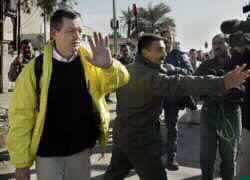U.S. and U.N. diplomats have reached a preliminary conclusion that Iraq's declaration of its weapons program failed to account for all of its chemical and biological agents, the envoys and officials said on Friday. The sources, who spoke on condition of anonymity, said an early review of the 12,000-page declaration indicated that the document appeared to fall short of what was required under a tough Nov. 8 U.N. Security Council resolution, which demanded Iraq disarm or face severe consequences.
In addition to failing to account for chemical and biological agents missing when U.N. inspectors left Iraq in 1998, the document also did not answer why Iraq allegedly sought nuclear technology in recent years, the sources said.
They cited as examples Iraq's failure to explain what happened to 550 shells filled with mustard gas, and another 150 aerial bombs possibly filled with biological agents, which the United Nations could not account for in the late 1990s.
Also unaccounted for when U.N. arms inspectors left Iraq in December 1998 were 20 tons of complex growth media that could be used to nourish biological weapons and 200 tons of chemicals for the nerve agent VX.
"There doesn't seem to be an awful lot in there that's new. And a lot of it seems much the same as in a 1996 declaration when Iraq gave a full declaration," said a U.N. diplomat.
The United States, which seeks to oust Iraqi President Saddam Hussein, could try to use any perceived violation of the Nov. 8 Security Council resolution -- such as an incomplete weapons declaration -- as a justification for war. But the other 14 U.N. Security Council members will want to hear from weapons inspectors rather than just accept the U.S. analysis.
Washington insists Baghdad has continued to pursue weapons of mass destruction but Iraq denies this.
BLIX BRIEFING THURSDAY
U.N. chief weapons inspector Hans Blix, together with Mohamed ElBaradei, head of the International Atomic Energy Agency, are expected to give preliminary findings to the Security Council in New York on Thursday.
The Bush administration would not comment on the status of the U.S. review of the arms declaration, which Iraq turned over to the United Nations in Baghdad last Saturday. A U.S. official said Washington was waiting for Blix to comment first before giving any kind of formal assessment.
Blix is expected to say there were still unanswered questions. He may go back to Iraq and ask officials there to answer them, the U.N. diplomats said.
He may also begin interviews with Iraqi scientists and others, but at this point it is doubtful they would be whisked out of the country with their families, despite U.S. insistence, because of the difficulties in doing so.
Only the five permanent council members -- the Untied States, Russia, China, Britain and France -- have complete copies of the declaration, in addition to the U.N. inspection commissions. The other 10 members are expected to receive copies on Tuesday, with up to 2,000 pages excised that could provide recipes for making weapons of mass destruction.
The current U.S. sentiment is that Washington wants to let the U.N. inspections process have a chance to succeed and give Saddam a chance to disarm.
Hostile U.S. rhetoric was tamped down and officials emphasized they wanted to consult with other members of the U.N. Security Council and hear Blix's assessment.
Military preparations continued, however, in case President Bush concludes that Baghdad is still resisting attempts to dismantle any banned weapons programs it has and concludes military action is needed to achieve that.
Defense Secretary Donald Rumsfeld on Wednesday signed a new accord with Qatar's foreign minister to upgrade Qatari military bases which the Americans could use in any conflict with Iraq.
BUSH MAKING "CAREFUL REVIEW"
White House spokesman Ari Fleischer would give no preliminary review of the Iraqi document, saying Bush would have something to say after a "thoughtful, careful review" of the lengthy document is completed.
"As I have indicated all week, the president's approach is to look at this in its totality. That's how the president intends to do this. We look forward to working with our allies, and the United Nations. There will come a time when the president will have something to say about it," he said.
In an ABC News 20/20 interview to air on Friday night, Bush said it was too early to tell whether Saddam was lying, but sounded skeptical. "I don't want to prejudge the report. But my gut feeling about Saddam Hussein is that he is a man who deceives, denies. He's a man who states his power through torture and murder," Bush said
PHOTO CAPTION
An Iraqi soldier guards a member of the U.N. inspection team (L) as he leaves the Center for the Control of Communicable Diseases, run by the Health Ministry in Baghdad, Dec. 13, 2002. U.N. experts searched a missile plant and a disease control center in Baghdad on Friday, the first time they have operated on the Muslim holy day since returning to Iraq last month. (Suhaib Salem/Reuter
- Author:
News Agencies - Section:
WORLD HEADLINES


 Home
Home Discover Islam
Discover Islam Quran Recitations
Quran Recitations Lectures
Lectures
 Fatwa
Fatwa Articles
Articles Fiqh
Fiqh E-Books
E-Books Boys & Girls
Boys & Girls  Articles
Articles










